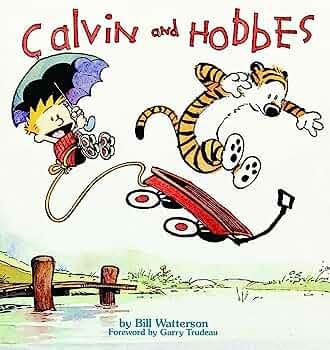An Open Letter to a Comic Book Resources Contributor
Dear Lukas (if I may),
I suspect you weren’t anticipating a formal response to your Comic Book Resources piece “10 Ways Calvin and Hobbes Has Aged Poorly”. It’s not that kind of piece.
Actually, my first response was quite informal. I tweeted that you’re a loser. I’m sure you’re not a loser, Lukas, so forgive me for that — but you did a very good impersonation of a loser in your piece.
Still, I suspect you didn’t take the piece all that seriously. That’s why I’m not addressing this to you by your full name. I don’t want it to haunt you on Google forever.
But the fact is that you — yes, you — are part of the reason why writing could be doomed. I could etch “10 Ways Calvin and Hobbes Has Aged Poorly” onto the gravestone of criticism. No one would shed a tear.
What were you attempting to achieve with your piece? To get clicks for Comic Book Resources, of course, but I can’t believe that’s the only reason. Do you really think Calvin “is way too violent for a 6-year-old”? Have you ever met a 6-year-old? Do you really think Calvin “might be reviled for his actions with Susie” (Calvin’s more mature and well-behaved female rival)? Even Chairman Mao wouldn’t have believed that 6-year-old boys and 6-year-old girls could be conditioned out of squabbling with one another.
Do you really think that Calvin being “unsupervised in an enormous forest” is an example of “terrible parenting that has aged horribly”? Never mind that it would seem bigger to him, as a child, than it would to us. Do you think helicopter parenting has been a great development?
Has Calvin and Hobbes “aged poorly” because no one tries to stop Calvin’s unpleasant school bully? “In the modern world, students would receive instant support in the face of bullying,” you write. Really? How many children have you asked?
I struggle to accept that you’re so dense as to believe in this nauseating combination of complacent presentism and totalistic moralism. But the alternative is that you battered out this unlovely listicle to wind people up — to problematise a much-loved creation just to tarnish people’s day. Is that possible? I’d hate to think it is. Perhaps — and I really believe that this could be the case — you simply didn’t think it through.
I know I’m aiming a bazooka into a barrel here. But it’s just infuriating to see someone approach one of the purest examples of creative work in modern times — recall that Bill Watterson stubbornly resisted attempts to commercialise Calvin and Hobbes, and I suspect he would resist attempt to make it the subject of listicles — with this sort of joyless Buzzfeedesque finger-wagging.
You like Calvin and Hobbes. You’ve written about it in other pieces. So, why do you want to be more like Buzzfeed than like Bill?
That is bad enough in itself. But it also has unpleasant implications for writers. What are you doing that an AI couldn’t do? Type “10 Ways Calvin and Hobbes Has Aged Poorly” into an AI text generator and it will spit out an article similar to yours in seconds. In fact, I think an AI could have written “10 Ways Calvin and Hobbes Has Aged Poorly” better. It could have talked about how there are no BAME characters, for example — equally stupid but far more effectively trollish than “Miss Wormwood Bullies Calvin”.
When you write such a lazy and opportunistic piece you’re also conditioning readers to expect that sort of prose. You’re conditioning them to expect the kind of regurgitated pablum that a text generator could produce on demand. You’re contributing to your own redundancy, Lukas, and to the redundancy of what we love to do.
It’s unfair to pick on you, of course. God knows most of us have written the sort of slapdash rants that could be automated on a tech nerd’s lunch break. I know I have. (Not often, I hope. But I’ve done it.) I’ve never written something that I didn’t believe in, but I’ve written about things I didn’t really care about — and in a manner that could only inspire cheap agreement or vague antagonism. The critical pen could menace me too.
There’s nothing wrong with provocation. Sometimes orthodoxies have grown mould, and received wisdom has grown delusional. But mere provocation is the mirror image of mere flattery — blandly automatic and automatable.
Of course, mere provocation and mere flattery, which are often one and the same, attract eyeballs. There are sweet incentives towards indulging in them. But to bring them into being is, quite apart from being inherently degrading, to sign your own professional death warrant. Click-hungry editors will soon be able to automate this stuff. Do you think the Mail or the New York Post will be above it? They are not above speculating about Britney Spears’ potential OnlyFans revenue. Of course they’re not.
What about Comic Book Resources? Are they above automating you? Have they done it already? Do you even exist? (I’m kidding — I think.)
I’m tempted to get “10 Ways Calvin and Hobbes Has Aged Poorly” tattooed on the insides of my eyelids in neon letters. That way, if I am tempted to write something only for income or attention I will see those awful, sickly words and think again.
If you want an image of a future we should try to avoid, imagine a text generator producing mirthless moralistic listicles — forever.
Yours,
Ben



The best one was “Dinosaurs actually had feathers, which contradicts Calvin’s imagination”. Imagine a small child’s imagination not being exactly accurate with regard to science! Do better, Calvin!
At first I thought poor Lukas was an ultramontanist taking aim at the bitter fruits of the reformation...